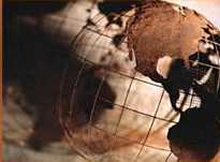
Asia-Pacific Free Trade Zone Plan Mulled
President pledges long-term US engagement in ''developing'' Asia
 WASHINGTON, DC – 11/21/06 – The US will give “serious consideration” to the idea of creating a free-trade zone that would span five continents and include countries that represent nearly half of global trade, according to President George Bush. WASHINGTON, DC – 11/21/06 – The US will give “serious consideration” to the idea of creating a free-trade zone that would span five continents and include countries that represent nearly half of global trade, according to President George Bush.
Speaking in Singapore last week before the Asia-Pacific Economic Cooperation (APEC) leaders' meeting in Hanoi, Vietnam, the president said the proposal advanced by some of the 21 member economies “deserves serious consideration” and called APEC “the premier economic forum in the region.”
He said that APEC has great potential to boost economic and development opportunities through expanded free trade.
“We will do our part to help APEC become a stronger organization that serves as an engine for economic growth and opportunity throughout the region,” Bush said.
The idea of a free-trade pact was first broached two years ago by the APEC Business Advisory Council.
According to Council’s more recent October report, a group-wide agreement would create many benefits for APEC members.
In particular, it would make doing business less complex and costly by bringing into line more than three dozen free-trade deals signed or currently being negotiated among the member economies.
But the report also acknowledged practical difficulties in negotiating such a pact, mostly because it would require changing the non-binding decision making character of the group.
APEC member economies are Australia, Brunei Darussalam, Canada, Chile, China, Hong Kong, Indonesia, Japan, South Korea, Malaysia, Mexico, New Zealand, Papua New Guinea, Peru, the Philippines, Russia, Singapore, Taiwan, Thailand, the US, and Vietnam.
Bush’s message on the need for more free trade between the US and its Asian partners was endorsed by the country’s largest business lobbying group.
A recent report by the US Chamber of Commerce to coincide with the president’s Asia trip said Washington’s efforts to negotiate regional and bilateral trade agreements in Southeast Asia are an important priority for the US business community.
The report called on the Bush administration to help US-based compete in the region by investing in capacity-building initiatives that support regional economic reform and integration, increasing funding for export-promotion programs and streamlining US visa procedures.
Governments of the 10-member Association of Southeast Asian Nations (ASEAN) that the report specifically addresses were urged to increase their competitiveness by establishing predictable investment regimes; promoting liberalization of financial services and good corporate governance; and increasing protection of intellectual property.
The ASEAN is comprised of Brunei Darussalam, Cambodia, Indonesia, Laos, Malaysia, Burma, Philippines, Singapore, Thailand, and Vietnam.
Bush also called on nations in the Asia-Pacific region to help revive World Trade Organization (WTO) talks aimed at liberalizing trade worldwide.
The negotiations officially known as Doha Development Agenda, or Doha Round, collapsed in July mainly over the issue of agricultural subsidies and tariffs.
Asian countries had played a relatively small role in the talks dominated by the US, the European Union, Brazil, India and some other emerging market countries, according to independent observers.
Bush said the US “is committed to a breakthrough in the Doha negotiations,” but believes that only an ambitious outcome will create conditions for achieving the far-reaching goals set when the round started in 2001.
The president pledged long-term US engagement in Asia because “our interests depend on the expansion of freedom and opportunity in this region.”
Go
back, or read the latest Front Page stories:
Japan Slammed for Protectionist Ag Policies

TOKYO, Japan – 02/21/07 – Japan is coming under increased pressure from Washington to tear down the trade barriers that it says largely closes the Japanese market to US agricultural exports; the country needs to do more to open its markets, asserts US Ambassador to Japan Ambassador Schieffer, who called agricultural trade a ''stumbling block'' for greater economic cooperation between the two countries.

Progress at Latest US-Korea FTA Talks

WASHINGTON, DC – 02/17/07 – US and South Korean negotiators are reporting ''substantial'' headway at the conclusion of the latest four-day round of talks to forge a free trade agreement between the two countries; senior US negotiator Wendy Cutler cites that specific achievements include duty-free status for electronically traded products such as software, music and movies and ''rules of origi'n'' for critical products such as chemicals, pharmaceuticals and plastics.

Out !...Out, Damned Spam ! Out I Say ! *

WASHINGTON, DC – 02/12/07 – Seen at worst as a danger to Internet security and as a mere annoyance at least, spam – unwanted, unsolicited, mass commercial e-mail – is being targeted for international eradication; but some hurdles stand in the way in curbing its sway in the US as no reliable statistics exist on the percentages of spam that comes either from marketers located within or outside the US. (* With sincere apologies to William Shakespeare)

|

